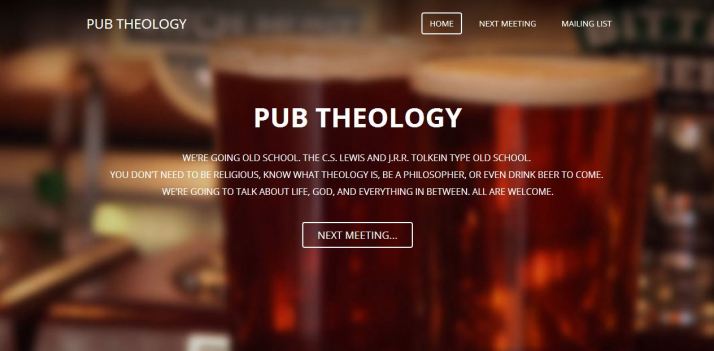I don’t know about you, but my heart sinks like a lead elephant whenever I am at a church gathering and the person leading the session says something like—and now let’s turn to our neighbour and talk about this for a couple of minutes—CLANG!
Having said that I do do that quite often in my sermons—you have been warned! But I have found actually that I have had some of the most engaging and interesting debates about theology, God, faith, religion and all that kind of stuff, not in a university common rooms, or a discussion groups, or in small buzz groups where we had to chat to our neighbour—but in pubs. With a pint in my hand, some pork scratchings, and the comforting murmur of chatter and clink of glasses. Something about that brings out the best in theological debate. That is part of the reason I am hoping to start a thing called ‘Pub Theology’ open, honest debate over a pint (or two) in a local hostelry.
If this sermon had a title it might well be, “Leave the church, and get down the pub”. I read with interest this week that the happiest profession (according to the Cabinet Office) is that of vicars and priests. The least happy is Publican. So perhaps us Vicars should share a bit of our happiness…
For we meet all kinds of people when we venture outside these sacred walls and we find many opportunities to share, debate and grow our faith too.
Take our Gospel reading this morning. When Jesus met the Samaritan woman by the well at Sychar, he engaged in a keen theological and ecclesiological debate with her.
And just like those crusty Victorian Christians who would raise an eyebrow at the very thought of a vicar in the pub, interacting with this woman would have raised a few eyebrows in his own day. He breaches the conventions of polite society by even talking to her. Then he asks her for a drink, Samaritans and Jews did not share things in common—John reminds us. Jews were forbidden to drink from any vessel handled by a Samaritan.
But talk to her he does and the woman is hooked by the fact that Jesus knows her history, and immediately eager to talk more with him. She recognises that there is something special about him.
But he’s not a Samaritan, like she is. His temple resides in Jerusalem; her sacred site is on Mount Gerizim. Their people read different scriptures. Their rival religious traditions make competing claims about who belongs to God and how God can be known. The divisions between her and Jesus appear insurmountable, according to the terms of their contemporaries’ religious debates.
Once she raises the tangled and divisive issue about the parameters of true and false forms of worship, Jesus cuts the knot. Authentic worship happens, he says, not in a specific, designated place but in specific relationships.
Authentic encounters with God occur “in spirit and truth.” They occur with Jesus, where he chooses to be, freely roaming among Jews, Samaritans, and the rest of the world.
Jesus’ disclosure about where and how we meet God reframes the whole issue. It’s a change so disruptive, so different, it sounds like the kind of thing the Messiah might bring to pass. The woman senses this.
“I’m glad you mentioned the Messiah,” Jesus seems to say in response. But the words he uses to introduce himself as such are simpler and more stunning: He tells her, “I am.”
Numerous English translations render Jesus’ line as “I am he,” but there is no “he” in the Gospel’s original Greek text. As far as the Gospel of John is concerned, Jesus utters the name of God: “I am.” It’s a name first revealed to Moses in the book of Exodus. Jesus’ point is this: “If you want to know how and where God can be authentically known…well, I’m right here. Not limited to a temple, but here, sitting with you, beside this well.”
In cutting through the debate between Jews and Samaritans about where to worship, Jesus punctures traditions and expectations about the right way to be religious. In Jesus, God shows a commitment to know and to dwell among people. Not only is God present outside the walls; God promises also to be found there.
This scene asserts that God is not confined to churches — neither to architectural structures topped with steeples, to set-apart “sacred” sites, nor to communities of Christians. Therefore, not only is God served or honoured by our activity “out in the world,” God is encountered there, in our interactions with friends and strangers.
People of faith ought to leave their churches every now and then — not to abandon their communities or religious institutions, but to venture out in expectation that God will appear in a different setting.
When a Christian works in a food-bank, or sits in a pub or a park or a school, whether they work in a in a factory or an office or a board room, wherever Christians are and wherever they witness to their faith, they provide a tangible expression of God’s presence. Such a Christian presence makes a bold statement that God can be anywhere and everywhere, but most particularly God can be found in person-to-person interactions.
And if God is not confined to churches, or to gatherings of like-minded individuals, then we may need to reassess who God is and what a life of faith looks like. A God encountered outside the walls, encountered “in spirit and truth,” must be a God who dwells among flesh and blood, among pint pots just as much as among silver chalices. Jesus insists that God has come to be with us. All of us. Priests and publicans alike. Thanks be to God for that.
